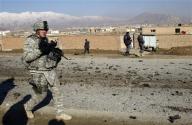 WASHINGTON – The Obama administration is likely to emphasize security goals in Afghanistan by approving extra troop deployments even before the White House completes its review of Afghan strategy, U.S. officials said on Tuesday.
WASHINGTON – The Obama administration is likely to emphasize security goals in Afghanistan by approving extra troop deployments even before the White House completes its review of Afghan strategy, U.S. officials said on Tuesday.
The emphasis on military operations reflects a shift in U.S. thinking that places greater priority on tangible short-term security goals and relegates more complex issues such as democracy and economic growth to longer-term planning, according to officials.
“There needs to be established a baseline of security,” Pentagon press secretary Geoff Morrell told reporters.
“We need to reverse the trend that we are seeing in some parts of the country in terms of a deteriorating security situation. That is accepted as the foundation on whatever the president decides to develop in terms of a further strategy.”
Pentagon officials recommend a higher priority for near-term military objectives in a newly completed report on Afghanistan by the U.S. Joint Chiefs of Staff, a senior defense official said.
The classified report, which has been forwarded to Defense Secretary Robert Gates, is part of a wide-ranging White House review of Afghan strategy more than seven years after U.S.-led forces first invaded Afghanistan.
President Barack Obama is expected to approve as early as this week plans to send up to 17,000 more combat troops to Afghanistan, where insurgent violence has reached its highest levels since the 2001 invasion that toppled the Taliban.
The expected deployment would represent the main segment of a planned build-up that could nearly double the number of U.S. troops in Afghanistan to about 60,000 troops from 36,000.
“Whatever decision is made on additional forces for Afghanistan will likely take place in advance of the conclusion of the strategy review that this White House has undertaken on Afghanistan,” Morrell said.
U.S. officials have long stressed that military force alone cannot stabilize Afghanistan and its future depends on so-called soft-power initiatives including economic and social development and good governance.
RISING INSURGENT ATTACKS
But rising violence has prevented even the most basic reconstruction and development work, especially in southern Afghanistan where most of the extra U.S. troops are expected to be deployed.
“You have to have an umbrella of security to achieve measurable progress in other areas like investment and farming,” said a senior defense official familiar with the Joint Chiefs report.
Insurgent attacks in Afghanistan rose 33 percent in 2008, according to NATO statistics. Attacks on government targets soared 119 percent while kidnappings and assassinations climbed 50 percent, according to the NATO figures.
Foremost among U.S. military objectives is quelling violence by Taliban militants and other groups, including fighters based over the border in northwestern Pakistan.
“The number-one focus … is ensuring that Afghanistan does not once again become a safe haven for terrorists, a place from which they can plot and launch attacks against us or our allies,” Morrell said at a briefing.
“Additional forces are needed to ensure that (Afghanistan) does not revert to that status,” he said.
But Pentagon officials denied that an emphasis on military operations meant soft-power objectives were less important.
“Nobody’s suggesting that the long-term goals aren’t good, appropriate goals to have,” said Bryan Whitman, another Pentagon spokesman.
“Sometimes we tend to focus only on long-range goals and … we need to ensure that we also have set for ourselves some short-range concrete goals for the near- and mid-term.”
 Eurasia Press & News
Eurasia Press & News